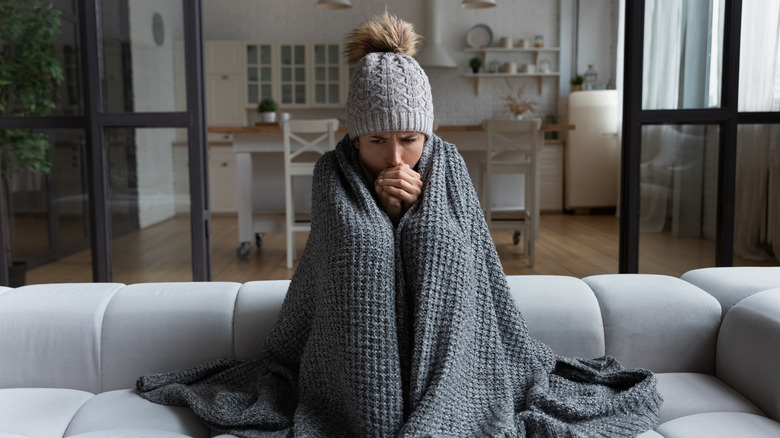This Is Why You're Gaining Weight In The Winter
If that rascally winter weight gain keeps sneaking into your house and shrinking all of your pants once the weather gets cold, you're not alone. A 2000 study published by the National Institutes of Health found that people gain an average of one pound during the cooler months. While this is probably a lot less than you expected, the study also reports that most people don't shed the extra weight once the weather starts warming up. After a few years of this, it can feel like the weight gain is starting to snowball (pun intended).
It's no wonder that people gain weight during winter. A 2006 study published in the European Journal of Clinical Nutrition found that people tend to eat slightly more and exercise slightly less during fall and winter compared to spring and summer. Some people may be tempted to pin down this difference to the yearly quest for a "summer body" when the weather gets hot — but there might be more to the story.
Thanks, evolution
We're not the only ones who fill up our cheeks when the weather gets cold. A 2014 study published in PLOS One found that other animals also eat more during the winter. Considering they aren't under more pressure to look thinner in the summer than they do in the winter, this suggests that seasonal fluctuations in diet may be biologically (and not just socially) motivated.
Dr. Andrew Higginson of the University of Exeter explains that before there were grocery stores, food was often harder for humans to find come winter. For that reason, evolution might have prompted people to eat more during the cooler months so they had a surplus of body fat to rely on in the event that food became scarce.
"Storing fat is an insurance against the risk of failing to find food, which for pre-industrial humans was most likely in winter," he says.
Men's Journal points out that our desire to eat more in the winter comes down to instinct. Being underweight when the weather turned once held serious repercussions for primitive peoples, and that few-pound insurance policy increased their chances of survival. Of course, Higginson says evolution hasn't quite caught up with us, and artificial food doesn't make it easier for us to say no to our natural urges.
Wait, Christmas cookies have calories?
In the United States, as well as many other parts of the world, fall and winter are considered to be the holiday season. Filled with festivities, we get together with friends, family, colleagues and neighbors to share laughs, snacks, cocktails, and always too much dessert. Every year it seems we hardly have time to digest Thanksgiving dinner by the time Christmas and Hanukkah roll around. And then there's New Year's Eve. That's a lot of festive eating and drinking.
Healthline suggests that a lot of winter weight gain can be credited to an increase in calories. The foods we eat are decadent and rich, there are sweets on every visible surface, and someone always seems to be offering you a drink. In fact, a 2018 survey conducted on behalf of Morning Recovery found that the average American drinks 100% more alcohol during the holiday season than they do during the rest of the year.
On top of that, a 2014 study published in PLOS found that when grocery shopping, Americans buy nearly 440 extra calories per serving during the holidays. Perhaps more surprisingly, that number increases by another 450 calories per serving after the holidays are over.
All snacks and no play
"Once we're good and full (and maybe a little buzzed), it's time to head to the gym," said no one, ever. As we loosen the reins on our healthy routines in lieu of a little holiday fun, our eating habits aren't the only things to change. In a 2021 review of 26 studies in the International Journal of Environmental Research and Public Health, it was determined that physical activity was highest in the summer and lowest in the winter. In most places, the winter sees the most sedentary behavior.
However, EOS Fitness says that even though we might be inclined to let our fitness routine go on holiday with us, exercising throughout the holidays can help combat all those extra calories we're eating and drinking. And because even the most wonderful time of year can have its moments, keeping up with our workouts can minimize the effects of stress and give us the boost of energy we need to keep the party going.
Less sun, more weight
As if losing our summer tans weren't bad enough, less time in the sun could also be contributing to our winter weight gain. In many parts of the world, the holiday season goes hand in hand with shorter days and colder weather. When we wake up before the sun rises and get home from work just as it's about to set, it can be almost impossible to get any meaningful amount of sun on our skin.
A 2017 study published in Nature found that our fat cells shrink when they get an adequate supply of vitamin D. Peter Light, the author of the study, notes that the opposite is also true. When we don't get enough vitamin D from the sun, those fat cells expand, making it possible for them to store more fat (per Observer). So when we go for months with inadequate sun exposure, Light explains that we're promoting fat storage within the cells — which can lead to winter weight gain.




